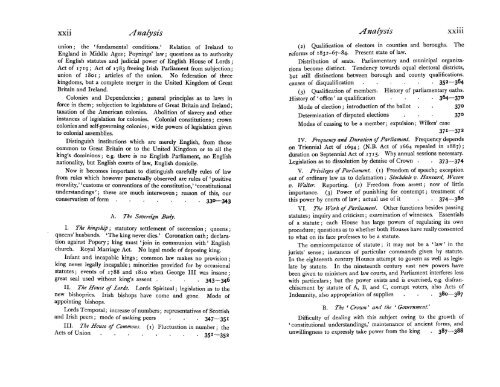The Constitutional History of England
The Constitutional History of England
The Constitutional History of England
Create successful ePaper yourself
Turn your PDF publications into a flip-book with our unique Google optimized e-Paper software.
xxii A ivadysis AnaGysis xxiii'union ; the 'fundamental conditions.' Relation <strong>of</strong> Ireland to<strong>England</strong> in Middle Ages; Poynings' law; questions as to authority<strong>of</strong> English statutes and judicial power <strong>of</strong> English House <strong>of</strong> Lords;Act <strong>of</strong> I 7 19 ; Act <strong>of</strong> I 783 freeing Irish Parliament from subjection;union <strong>of</strong> 1801 ; articles <strong>of</strong> the union. No federation <strong>of</strong> threekingdoms, but a complete merger in the United Kingdom <strong>of</strong> GreatBritain and Ireland.Colonies and Dependencies; general principles as to laws inforce in them; subjection to legislature <strong>of</strong> Great Britain and Ireland;taxation <strong>of</strong> the American colonies. Abolition <strong>of</strong> slavery and otherinstances <strong>of</strong> legislation for colonies. Colonial constitutions; crowncolonies and self-governing colonies; wide powers <strong>of</strong> legislation givento colonial assemblies.Distinguish institutions which are merely English, from thosecommon to Great Britain or to the United Kingdom or to all theking's dominions; e.g. there is no English Parliament, no Englishnationality, but English courts <strong>of</strong> law, English domicile.Now it becomes important to distinguish carefully rules <strong>of</strong> lawfrom rules which however punctually observed are rules <strong>of</strong> 'positivemorality,' 'customs or conventions <strong>of</strong> the constitution,' 'constitutionalunderstandings'; these are much interwoven; reason <strong>of</strong> this, ourconservatism <strong>of</strong> form . - 330-343A. <strong>The</strong> Sovereign Body.I. Tk kingsh$ ; statutory settlement <strong>of</strong> succession ; queens ;queens' husbands. '<strong>The</strong> king never dies.' Coronation oath; declarationagainst Popery; king must 'join in communion with' Englishchurch. Royal Marriage Act. No legal mode <strong>of</strong> deposing king.Infant and incapable kings ; common law makes no provision ;king never legally incapable; minorities provided for by occasionalstatutes; events <strong>of</strong> 1788 and 1810 when George I11 was insane;great seal used without king's assent . - 343 -34611. <strong>The</strong> House <strong>of</strong> Lords. Lords Spiritual; legislation as to thenew bishoprics. Irish bishops have come and gone. Mode <strong>of</strong>appointing bishops.Lords Temporal; increase <strong>of</strong> numbers; representatives <strong>of</strong> Scottishand Irish peers ; mode <strong>of</strong> making peers . . 347-351111. <strong>The</strong> House <strong>of</strong> Commons. (I) Fluctuation in number; theActs <strong>of</strong> Union . 351-352(2) Qualification <strong>of</strong> electors in counties and boroughs. <strong>The</strong>reforms <strong>of</strong> 1832-67-84. Present state <strong>of</strong> law.Distribution <strong>of</strong> seats. Parliamentary and municipal organizationsbecome distinct. Tendency towards equal electoral districts,but still distinctions between borough and county qualifications.causes <strong>of</strong> disqualification . 352-364(3) Qualification <strong>of</strong> members. <strong>History</strong> <strong>of</strong> parliamentary oaths.<strong>History</strong> <strong>of</strong> ' <strong>of</strong>fice ' as qualification . 364-370Mode <strong>of</strong> election ; introduction <strong>of</strong> the ballot . 370Determination <strong>of</strong> disputed elections . 370Modes <strong>of</strong> ceasing to be a member; expulsion; Wilkes' case371-372IV. Ei-equency and Duration <strong>of</strong> Parliament. Frequency dependson Triennial Act <strong>of</strong> 1694 ; (N.B. Act <strong>of</strong> 1664 repealed in 1887) ;duration on Septennial Act <strong>of</strong> I 7 I 5. Why annual sessions necessary.Legislation as to dissolution by demise <strong>of</strong> Crown . 373-374V. Priztileges <strong>of</strong> Parliament. (I) Freedom <strong>of</strong> speech; exceptionout <strong>of</strong> ordinary law as to defamation ; Stockdale v. Hansard, Wasonv. Walter. Reporting. (2) Freedom from arrest ; now <strong>of</strong> littleimportance. (3) Power <strong>of</strong> punishing for contempt; treatment <strong>of</strong>this power by courts <strong>of</strong> law ; actual use <strong>of</strong> it - 374-380VI. <strong>The</strong> Work <strong>of</strong> Parliament. Other functions besides passingstatutes; inquiry and criticism; examination <strong>of</strong> witnesses. Essentials<strong>of</strong> a statute; each House has large powers <strong>of</strong> regulating its ownprocedure; questions as to whether both Houses have really consentedto what on its face pr<strong>of</strong>esses to be a statute.<strong>The</strong> omniconlpetence <strong>of</strong> statute; it may not be a 'law' in thejurists' sense; instances <strong>of</strong> particular commands given by statute.111 the eighteenth century Houses attempt to govern as well as legis-late by statute.In the nineteenth century vast new powers havebeen given to ministers and law courts, and Parliament interferes lesswith particulars; but the power exists and is exercised, e.g. disfranchisementby statute <strong>of</strong> A, B, and C, corrupt voters, also Acts <strong>of</strong>Indemnity, also appropriation <strong>of</strong> supplies . . 380-387B. <strong>The</strong> ' Crown ' and the ' Government.'Difficulty <strong>of</strong> dealing with this subject owing to the growth <strong>of</strong>'constitutional understandings,' maintenance <strong>of</strong> ancient forms, andunwillingness to expressly take power from the king . 387-388
















